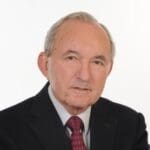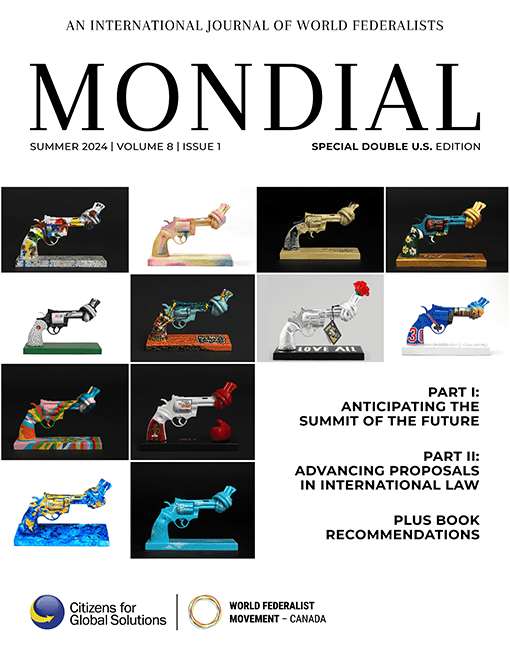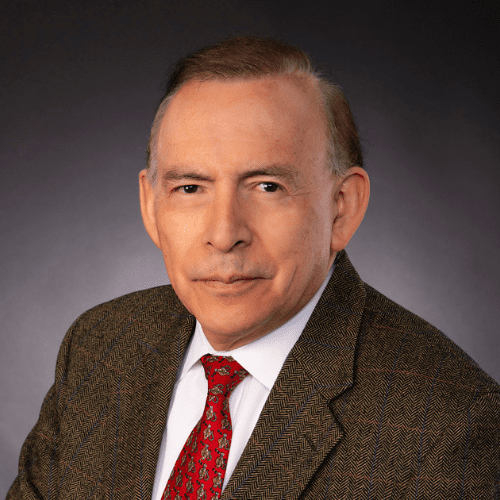Mondial Article (Summer 2024)
The Progressing Proposal for an International Anti-corruption Court

Justice Richard Goldstone
Justice Goldstone is a former Justice of the Constitutional Court of South Africa and the first Prosecutor of the International Criminal Tribunals for the former Yugoslavia and Rwanda. He is the Vice Chair of Integrity Initiatives International and the Chair of the International Anti-Corruption Court Treaty Committee.
Grand corruption – the abuse of public office for private gain by a nation’s leaders (kleptocrats) – is not a victimless crime. It is a major barrier to meeting the United Nations (UN) Sustainable Development Goals (SDGs), responding effectively to pandemics, fighting climate change, promoting democracy and human rights, establishing international peace and security, and securing a more just, rules-based global order. In developing countries, over ten times more money is lost to illicit financial flows than is received in foreign aid.
At present, there is no international institution to hold kleptocrats accountable for their crimes of corruption when the countries they rule are unwilling or unable to do so. An International Anti-Corruption Court (IACC) would, therefore, fill the crucial enforcement gap in the international framework for combating grand corruption. It would constitute a fair and effective forum for the prosecution and punishment of kleptocrats and their collaborators; deter others tempted to emulate their example; and recover, repatriate, and repurpose ill-gotten gains for the victims of grand corruption.
In addition, as then UN High Commissioner for Human Rights Navi Pillay explained, “Corruption kills. The money stolen through corruption every year is enough to feed the world’s hungry 80 times over … Corruption denies them their right to food and, in some cases, their right to life.” The COVID-19 pandemic makes this even more clear. It has, predictably, proven to be a bonanza for kleptocrats because trillions of dollars have been disbursed without even the usual, frequently ineffective safeguards. Grand corruption also contributes to climate change and is a major impediment to ameliorating it. For example, kleptocrats profit greatly from the illicit forestry trade, which is estimated to be worth $51–$152 billion annually. Unless something significant is done to deter grand corruption, a large percentage of the billions in aid intended to diminish climate change will be misappropriated by kleptocrats and their collaborators. The primary recipients of government climate-related development aid are countries that are perceived as among the most corrupt in the world. In addition, the risk of corruption will discourage private investment from being made in the countries that need it most. This will particularly injure the poor and powerless, who are disproportionately harmed by climate change and increasingly forced to migrate because of it.
Any effort to alleviate the world’s refugee crises must, therefore, address a fundamental cause of forced migration: grand corruption. In addition, citizens’ indignation at grand corruption has destabilized many countries and, as a result, created grave dangers for international peace and security. Grand corruption is also antithetical to democracy. Kleptocrats regularly repress independent journalists and civil society organizations with the potential to expose their criminal conduct. The individuals, corporations, and criminal syndicates that bribe kleptocrats also illegally finance campaigns in elections that are neither free nor fair. Because grand corruption pollutes the international financial system and has other severe international consequences, it is not just a domestic problem for individual countries to address alone. Rather, it is a global problem that requires a global solution.
Almost all of the 190 parties to the UN Convention against Corruption (UNCAC) have enacted the required statutes criminalizing bribery, money laundering, and misappropriation of national resources. The Vienna Convention on the Law of Treaties requires that each country make a good-faith effort to enforce those laws. However, some states that are party to the UNCAC are governed by kleptocrats who enjoy impunity in the countries they rule because they control the police, prosecutors, and courts, which are often also corrupt themselves. Those kleptocrats will not permit honest, effective investigation of themselves or their criminal collaborators. Statutes such as the US Foreign Corrupt Practices Act (FCPA) and its 43 counterparts enacted in countries that are party to the Organisation for Economic Co-operation and Development (OECD) Convention against Bribery are inadequate to erode the impunity kleptocrats enjoy. Those statutes permit the prosecution of individuals and organizations that pay bribes but not of the public officials who demand or accept them. In addition, except in the United States and, recently, the United Kingdom, Switzerland, and Israel, those statutes are rarely, if ever, enforced. The absence of risk of punishment, particularly imprisonment, contributes greatly to the pervasiveness and persistence of grand corruption.
Elements of the International Anti-Corruption Court Proposal
Because grand corruption has international consequences and flourishes in many countries in meaningful measure due to the lack of enforcement of domestic criminal laws, the IACC is justified and necessary. Creation of the IACC was first proposed in 2014. It has been, and remains, an evolving concept. Some details concerning the IACC must be further developed. However, the fundamental features of the IACC as currently conceived include the following.
Officials Subject to Prosecution in the IACC
The IACC would have the authority to prosecute Heads of State or Government, certain other high-level public officials (such as those appointed by a Head of State or Government), and anyone who knowingly and intentionally assists one or more of these individuals in the commission of a crime within the IACC’s jurisdiction. Therefore, the IACC would, for example, have the authority to prosecute private parties who pay bribes or who assist in laundering the proceeds of crimes of corruption committed by public officials whom the court has the authority to prosecute. Heads of State or Government, and other officials within the jurisdiction of the court, would not have immunity from prosecution in the IACC while in, or after holding, office.
Crimes Subject to Prosecution in the IACC
The IACC would have the authority to enforce the laws required by the UNCAC, particularly those criminalizing bribery of public officials, embezzlement of public funds, misappropriation of public property, money laundering, and obstruction of justice. The IACC would not require the creation of any new norms. Rather, it would provide a forum for the enforcement of existing obligations that are codified in the criminal laws of virtually every country but not enforced against kleptocrats and their collaborators in the countries that the kleptocrats rule.
Authority to Prosecute Nationals of Non-member States
The IACC would have jurisdiction to prosecute nationals of Member States and foreign nationals who commit all or elements of a crime within the jurisdiction of the IACC in the territory of a member state. Therefore, a kleptocrat who, for example, accepts a bribe in a state that is not a member of the IACC and uses the banking system of a member state to transfer or hide the proceeds of that crime in violation of the member state’s domestic laws could be prosecuted for money laundering in the IACC if the member state were unable or unwilling to prosecute. This is important because kleptocrats routinely conspire with enablers to use international financial systems to launder the proceeds of their corrupt conduct and to relocate them as assets in attractive foreign destinations, while attempting to mask their beneficial ownership of those assets. Crimes such as conspiracy and money laundering are continuing offenses, elements of which may be committed in part in several jurisdictions. If an official of a non-Member State or a co-conspirator launders money in a Member State, he or she would be subject to prosecution in that member state or, under the principle of complementarity, subject to prosecution in the IACC if the member state itself were unable or unwilling to prosecute.
Complementarity
The IACC would be a court of last resort. Operating on the principle of complementarity, it would investigate or prosecute only if a member state itself were unwilling or unable to do so. Like the ICC, the IACC would consider, for example, whether the member state is already investigating or prosecuting the matter; if so, whether those actions constitute a good-faith effort or a pretext to protect a possible criminal from being held accountable. In addition to the factors in Article 17 of the Rome Statute, in deciding whether a member state is unwilling or unable to carry out an investigation or prosecution, the IACC might also consider whether its national judiciary generally operates honestly rather than corruptly. An IACC operating under the principle of complementarity would give many countries an incentive to improve their own capacity and efforts to prosecute corruption. The IACC will employ investigators experienced in conducting complicated financial investigations; work with national and multinational agencies that do so, such as the International Anti-Corruption Coordination Centre; and also work with sophisticated private investigators who are often employed by state agencies to trace looted assets. In addition, the IACC will employ prosecutors with experience in trying complicated cases concerning financial crimes, and it will be comprised of judges with substantial experience in presiding in such cases.
The Importance of the IACC for Victims of Grand Corruption
Kleptocrats rob the countries they rule of vast sums that are needed for the health and welfare of their citizens. Corruption is, therefore, a major obstacle to achieving the 2030 SDGs. The criminal prosecution of kleptocrats in the IACC would result in the recovery and return or repurposing of stolen assets. The sentence for the conviction of a kleptocrat in the IACC could include both a term of imprisonment and an order of restitution or disgorgement of illicit assets for the benefit of victims. The capacity of the IACC to recover the proceeds of grand corruption would be magnified if the court were empowered to decide civil cases brought by private whistleblowers.
Perhaps the greatest value that the IACC would provide to victims of grand corruption would be creating the credible threat that kleptocrats will be prosecuted and punished, thus deterring them from committing crimes that are difficult to address and redress after they occur. Evidence indicates that prosecutions of human rights abuses in the ICC, as well as in domestic courts, are deterring violations of human rights. ICC investigations have, for example, catalyzed reforms in the Democratic Republic of the Congo, Sudan, Guinea, Georgia, and Colombia. The deterrent effect of an International Anti-Corruption Court on grand corruption should be even greater than the ICC’s impact on violations of human rights. If the threat of prosecution in the IACC does not deter a kleptocrat, successful prosecution there would likely result in a sentence of imprisonment and probably, therefore, the official’s removal from office. This would provide the best antidote to grand corruption: the opportunity for the democratic process to replace kleptocrats with leaders dedicated to serving their citizens rather than enriching themselves.
The Campaign to Create the IACC
The most common criticism of the IACC idea was once that it would not be politically feasible to create. That criticism has been muted in recent years. As a result of advocacy by Integrity Initiatives International and its global partners, in the past few years, the governments of the Netherlands, Canada, Colombia, Nigeria, Ecuador, Moldova, and the Democratic Republic of the Congo have all publicly backed creation of the court. The current UK government has committed to championing the IACC proposal and more countries are becoming interested in the proposal.
The global campaign for the IACC is driven by over 100 civil society organizations, predominantly from Africa, and nearly 350 world leaders, including more than 50 former Heads of State and Government and over 30 Nobel laureates. An expert group of more than 70 international judges, lawyers, scholars, and anti-corruption specialists are working on a draft treaty to establish the court.
IACC Steps to Ratification
1. Declaration
First released in June 2021, the Declaration calling for the creation of an IACC has been signed by more than 300 world leaders from over 80 countries, including more than 45 former presidents and prime ministers and over 30 Nobel laureates.
2. International Steering Committee
Formed in July 2021, the International Steering Committee is building and leading the civil society coalition behind the campaign and contributes to strategic outreach to governments around the world.
3. Treaty Committee & Scholarly Review
Launched in August 2022, the IACC Treaty Committee – composed of international judges, international prosecutors, and other leading experts in International law is working on the core principles for a draft of the IACC treaty.
4. Broad and Inclusive Consultation
Once the draft IACC Treaty is complete, Integrity Initiatives International and its partners will organize a series of virtual consultations to present the draft and receive feedback from interested civil society around the world.
5. Negotiation
Ultimately, governments will need to negotiate and sign a treaty establishing the IACC. During this phase, Integrity Initiatives International and the campaign for the IACC will monitor negotiations and work to ensure that civil society has a voice in the negotiations.
6. Ratification
After the IACC treaty has been signed, the campaign for the IACC will continue outreach country-by-country to ensure that states ratify the treaty. Once the treaty comes into force, the campaign for the IACC will continue to monitor the implementation of the Court.
Mondial is published by the Citizens for Global Solutions (CGS) and World Federalist Movement — Canada (WFM-Canada), non-profit, non-partisan, and non-governmental Member Organizations of the World Federalist Movement-Institute for Government Policy (WFM-IGP). Mondial seeks to provide a forum for diverse voices and opinions on topics related to democratic world federation. The views expressed by contributing authors herein do not necessarily reflect the organizational positions of CGS or WFM-Canada, or those of the Masthead membership.


























